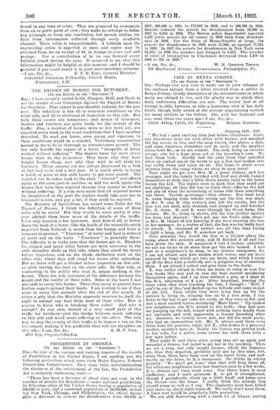THE EXPORT OF HORSES FOR BUTCHERY. [To THE EDTTOR OF
THE "SPECTATOR."] have recently visited Leith, Glasgow, Hull, and Goole to EC° the results of our Campaign Against the Export of Horses for Butchery. That export is considerably reduced, for the pre- sent. The reduction is due (1) to economic conditions on the other side, and (2) to strictness of inspection on this side. But both these causes are temporary; and means of transport, dealers and butchers aro quite ready for the revival of the traffic. Also, a number of horses, more or lees worn out, are exported every week to the cruel conditions that I have so often described. To send one horse, even young and vigorous, to those conditions would be a scandal. Veterinary examination seemed to me to be.as thorough as circumstances permit. The law only forbids the export of a horse "incapable of being worked without suffering." The dealers know far more about horses than do the inspectors. They know why they have bought horses cheap, and why they wish to sell them for butchery. These reasons are not always discovered by a look at feet and teeth and a trot past. It is worth while to bring a batch of more or less unfit horses to get some passed. The rejected can be taken back to the shed, " treated " and offered again at the same port or another, or sold for work again—the horses that have been rejected because they cannot be worked without suffering. If a rule were made that all rejected horses be slaughtered at the port the dealers would take care not to transport horses, and pay a fee, if they could be rejected.
The Ministry of Agriculture has issued some Rules for the Transit of Horses. I think the definition of some of these rules will be useful. But they would be more useful if who- ever advised them knew more of the details of the traffic. I can only mention a few instances. And, first of all, to fasten down the head of a horse (like the heads of the miserable cattle imported from Ireland) is worse than the bumps and bites it is•meant to prevent. "Provision "of water and food is ordered at ports. and on the boats " Provision " is generally there. The difficulty is to make sure that the horses get it. Blankets for clipped and many other horses are most necessary in the cold, draughty sheds on this side, where they stand for hours before inspection, and on the bleak, shelterless road on the other side, where they will stand for hours after unloading. But no horse will get a blanket before inspection on this side, or after leaving the boat on the other side. So that rule, so comforting to the public who read it, means nothing to the horses. These are only instances of the difference between the sound and the reality of these rules. Some of the boats I saw are unfit to carry live horses. Those they carry at present have leather cups to protect their heads. I am waiting to see if they cease to carry live animals after the end of this month. It seems a pity that the Ministry expressly reserves to itself the right to exempt any boat from most of these rules. How is anyone to know who is breaking these rules? And who is exempt? In any case, transit is a very small part of this traffic for butoltery—just the bridge between much suffering on this side and much more suffering on the other. The only way to stop the cruelty of this traffic is to impose a tax on the live export, making it less; profitable than sale for slaughter on


































 Previous page
Previous page